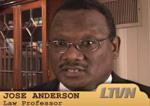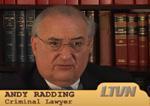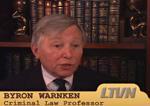Testify in My Own Defense?
JOSE ANDERSON: First of all its your decision to testify, but it is an important decision and you need to understand how your are testify could hurt the case.
ANDY RADDING: You can testify if you want to. You do not have to testify if you do not want to, but only you make the decision. The prosecutor cannot call you as a witness.
JOSE ANDERSON: If you do not testify their rules to protect you and one of those rules is that the prosector cannot comment on your favor to testify and you have a right against self-incrimination, which means he cannot comment on your failing to take the stand.
ANDY RADDING: If you cannot testify truthfully, do not get on the stand. Assume you are going to get nailed. You are going to get beaten up by the cross-examination. You are going to make a mistake and you are going to get caught in your own lies.
JOSE ANDERSON: You should be worried about if you done untruthful things in the past, you should be worried about whether you have been convicted of other crimes.
ANDY RADDING: What is in your background that may or may not be used against you when you are cross-examined. If you have a record of convictions, you know they are going to through that out.
BRYON WARNKEN [role playing testimony in court]:
Prosecutor: Sir, since your 18th birthday when you are represented by counsel have you even been convicted of a crime?
Defendant: Yes.
Prosecutor: Speak up sir, I did not here you?
Defendant: Yes.
Prosecutor: You have been convicted of a crime?
Defendant: Yes.
Prosecutor: What were you convicted of?
Defendant: Burglary.
Prosecutor: Speak up sir, I did not here you?
Defendant: Burglary.
Prosecutor: Burglary? You were previously convicted of burglary!
ANDY RADDING: If you have a record of bad conduct that somehow is going to get in under the rules of evidence, that is going to be used against you.
BRYON WARNKEN: They are not to convict you of this burglary because you did six other burglaries. Those are merely to affect your credibility. But you and I were not born yesterday. The jury is going to get back in that room and say, "he was convicted of burglary six times before, I'll bet he did this one."
ANDY RADDING: Those are big chances to take.
JOSE ANDERSON: On the other hand, the best person to put the story forward as to what happened in certain kinds of cases may be you and there are those cases where the jury wants to hear from you.
ANDY RADDING: There have been any number of fairly high profile criminal cases where there have been acquittals, where the defendants did not take the stand. And there have been lower profile cases that you never hear about.
JOSE ANDERSON: There will always be juries who believe if you are not testifying, you are guilty. You have to ask yourself the question could the harm of my being questioned outweigh the harm of my being silent.
The Privilege Against Self-Incrimination
"No person ... shall be compelled in any criminal case to be a witness against himself"
The Fifth Amendment protects witnesses from being forced to incriminate themselves. To "plead the Fifth" or to "take the Fifth" is a refusal to answer a question because the response could form self incriminating evidence.
Why not force a defendant to take the stand and tell the truth, even when the truth hurts? Well, in the not-so-good-old-days, a convenient means of securing convictions was to torture people into submission. Before long, they'd confess to just about anything. By prohibiting the prosecutor from forcing words out of the mouth of the accused, this disturbing tactic wouldn't work too well.
For this very reason, you have a right to remain silent even when the cops come up to you with a few questions. That same right extends to the trial of a case against you. No matter how much the prosecutor may yearn to cross-examine you, he can't call you as a witness and neither the judge nor jury can force you to testify.
Of course, you have a right to testify if you want to. But the decision on whether or not to take the stand is often one of the most critical judgment calls in any criminal case and one that should only be made in consultation with an experienced criminal defense lawyer.
As our legal experts demonstrated in this video, sometimes silence is truly golden when it comes to the defense of a criminal case.




